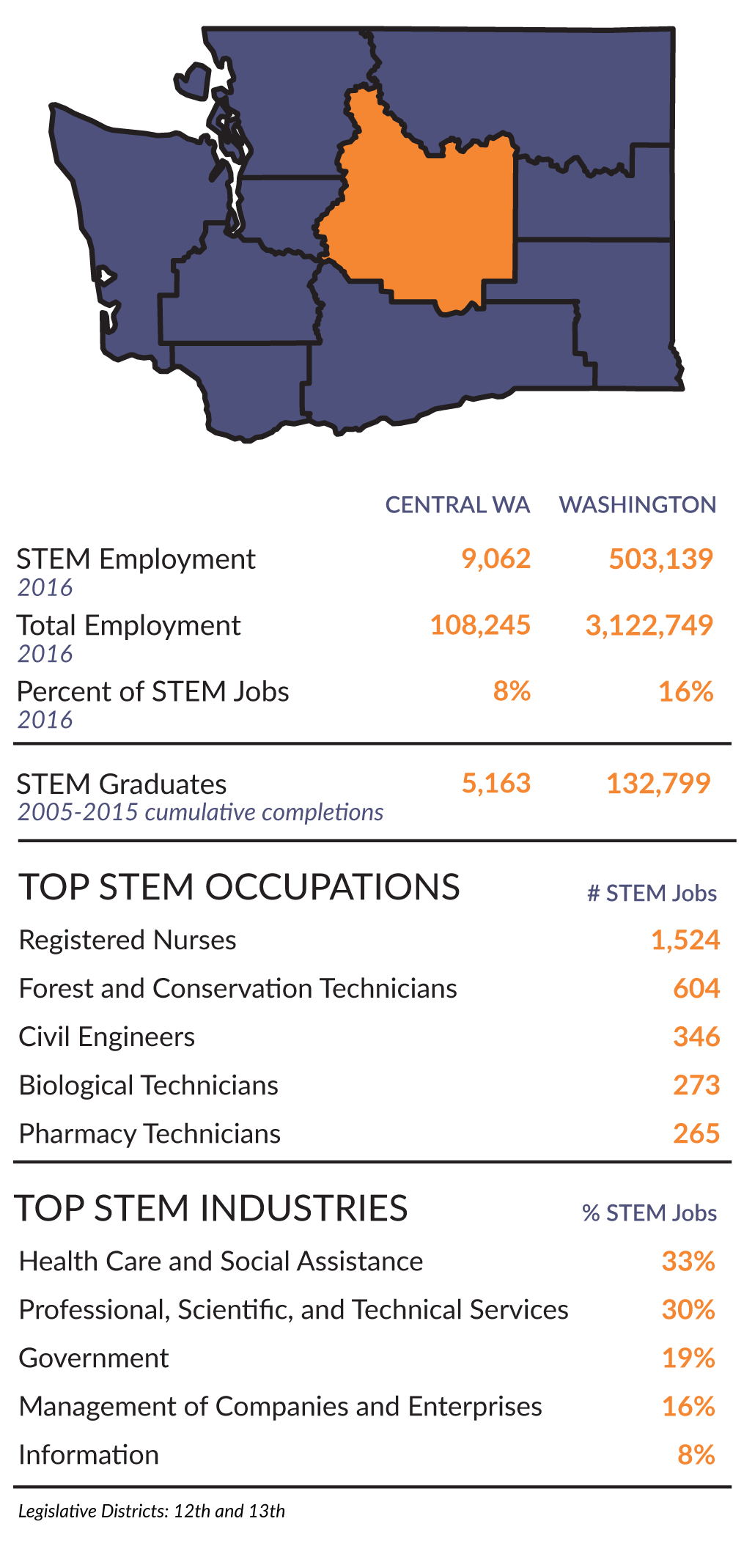

apple
Washington State University
Chelan County
What is your favorite apple variety? Fuji? Pink Lady? Well, prepare yourself for a new favorite: the Cosmic Crisp. The Cosmic Crisp is a cross between Enterprise and Honeycrisp, and set to hit grocery stores in 2019. This variety was first bred by Bruce Barritt and his team at the Washington State University Tree Fruit Research and Extension Center in Wenatchee. Now, after 20 years of breeding, testing, refining, the Cosmic Crisp rates higher in test groups on taste and texture, and is easier to grow and store. Typically, when a new variety is ready to enter the market, universities make an announcement to growers then hope it is successful. For the Cosmic Crisp, however, WSU partnered with growers and producers ahead of time to ensure a strong release with fair distribution and a strong placement in grocery produce sections. As traditional varieties such as Red Delicious and Gala have decreased in sales due to too much supply and decrease in consumer demand, industry leaders anticipate an upward surge for the state’s apple industry with the introduction of new varieties like the Cosmic Crisp.
Learn more: Washington State University , Capital Press
apple
Stemilt Growers
Chelan County
To continue to stay competitive in the marketplace, businesses must continue to innovate. This often means adopting new technology or ways of operating. For President West Mathison, who leads his family business Stemilt Growers, this means ongoing integration of new equipment and software, both of which enable his employees to see, analyze, and make decisions about fruit quality in real-time. For example, every one of Stemilt’s 1.5 billion cherries that are produced get scanned by a computerized machine that photographs each cherry 36 times - nearly 28,000 images per second. Before this machine, Stemilt had no visibility to the inside of its fruit, and thus couldn’t tell which cherries or apples were bruised or flawed on the inside. The machine takes this a step farther and actually kicks out the bad fruit, only letting the quality fruit continue down the line. Stemilt, located in Wenatchee is one of the largest tree fruit producers in the state, employing over 1,600 employees - a number that doubles during harvest - and in addition to the cherries, annually ships 20 million boxes of apples, pears, apricots, peaches, and nectarines. Part of Stemilt’s next innovation is the construction of its new packed fruit storage and shipping center, which will be highly automated. This ASRS (Automated Storage and Retrieval System) involves storage and retrieval with robotic cranes, automated dollies, and computerized tracking for efficiency and accuracy throughout the shipping process. Not only will the ASRS lead to cost savings in labor efficiencies, it will pave a path for employees to learn new skills such as how to operate and maintain this highly advanced system - both benefits that will only further Stemilt’s growth and strengthen its presence in the market.
Learn more: Crosscut , Capital Press

power energy
Chelan County Public Utility District
Chelan County
An aging workforce means retirement and job openings. As a significant economic driver and source of nearly 700 year-round jobs in Wenatchee, the Chelan County Public Utility District (PUD) is taking proactive steps to ensure a talent pipeline from its local schools to its many technical, bioscience and engineering jobs. In a recent partnership with the Foundation for Water & Energy Education (FWEE), the PUD offers a week-long summer program for up to 24 students from around the state to tour the PUD’s dams and learn about some of the responsibilities that go along with operating and maintaining Washington’s primary source of electricity: hydropower. In the program, students become ‘engineers’ and build a dam that uses water to turn on lights. Not only has the program supported the PUD by sparking interest in hydropower careers, but it has helped to create a pathway from local schools to local careers - all in high-skill, STEM fields. In establishing these industry-education partnerships, the North Central Washington community is fostering its own tech-driven economy.

other
Chelan County Public Utility District
Broadband, Chelan County
Washington is the leading producer of electricity from hydroelectric sources, accounting for 30% of the nation’s utility-scale hydropower generation. With this production comes jobs, economy, and development – particularly in communities that surround Washington’s dams. For instance, in Chelan County, the Chelan County Public Utility District (PUD) has leveraged its Public Power Benefit to fund the build-out of an expanded fiber-optic network, providing 85-90% of its county residents with access to high-speed internet service. The reliable, high-speed internet has not only benefitted North Central Washington’s local citizens and businesses, it has helped lay the infrastructure needed for economic development. Some of these new businesses include server farms and electricity intense enterprises – shifting the workforce demand from primarily a traditionally agriculture-dominated region to a more diverse, innovative economy.
other
Microsoft TEALS and Quincy High School
Broadband / Education, Grant, County
Quincy, Washington has a population of less than 7,500 yet because of the area’s affordable and renewable hydroelectric power, the town hosts multiple data centers including those of Microsoft, Dell, Intuit, Yahoo, Sabey, Vantage, and more. When Microsoft purchased 200 acres back in 2013, it created 100 full time jobs for the region. At the same time, the company partnered with the local high school to bring computer science to its students. The school is in its third year of using the TEALS program, which has helped train one of their math teachers the principles of computer science, allowing dozens of local students to get exposure to a key driver of the state’s economic growth – and even that of their own town.
Source: TEALS , GeekWire , DataCenter Knowledge
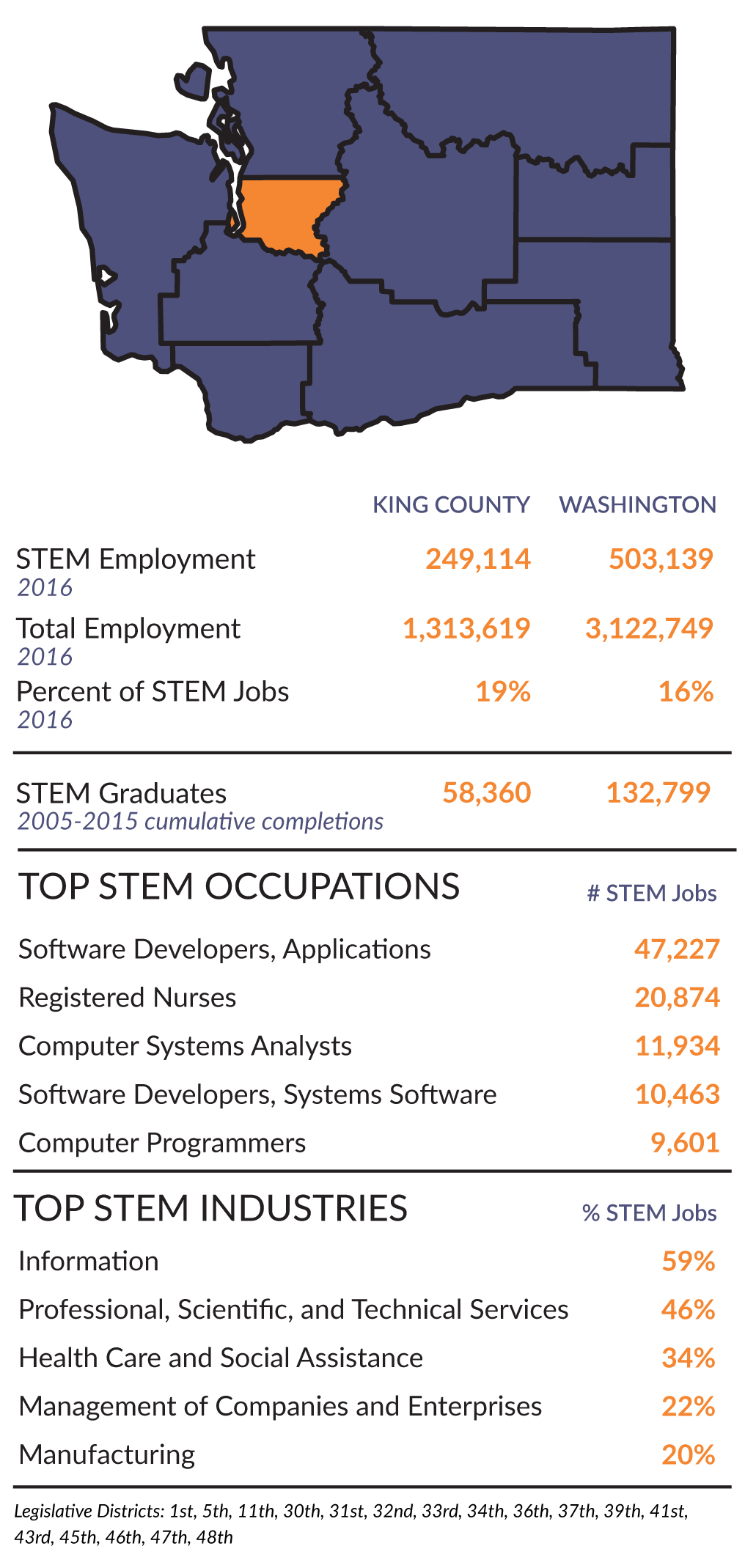

apple
Phytelligence
Burien, King County
Trees grow in soil...right? Washington State University start-up Phytelligence has figured out a way to grow trees - most commonly fruit trees - in a nutrient rich gel. This process was first created by Washington State University’s Professor Amit Dhingra in 2012 out of his Horticulture Genomics and Biotechnology Research laboratory, and now has 70 employees. The company has offices in Burien, Pullman and Portland, and grows up to 29 million plants each year. Primarily used during a tree’s early stages of growth, Phytelligence’s gel creates a controlled environment that helps cut down the number of viruses that might attack the young tree roots, and also helps maintain uniformity of the trees. Not only does this gel help create a more pest-free growing environment for trees, it helps farmers grow more plants more quickly. This sustainable technology supports the expedited growth of crops - from apples and cherries to almonds and hops, while decreasing water, pesticide, and fungicide use.
Learn more: Seattle Times Article , Phytelligence

health healthcare
Juno Therapeutics
Seattle, King County
Juno Therapeutics, a clinical-stage research company in Seattle is developing new technologies to direct the human immune system to recognize cancer cells as foreign biology and attack them. It’s a revolutionary approach for the treatment of cancer and other serious diseases.
Source: Juno Therapeutics
health healthcare
University of Washington
King County
Paralysis may soon be a thing of the past. The University of Washington College of Engineering’s Center for Sensorimotor Neural Engineering (CSNE) and its Ability & Innovation Lab have partnered to leverage advancements in artificial intelligence, mechanical engineering and robotics to address the effects of nervous system damage caused by, for example, a stroke or a spinal cord injury. Students, researchers and doctors are recording and decoding brain activity, then creating an algorithm that is used to program an implantable brain-computer interface (BCI). The BCI device essentially acts as a pseudo nervous system, allowing humans to use their brains to bring robotic or paralyzed limbs to life. This innovation in neural engineering is already being applied by UW students as they work with 10-year-old study participant Jayna Doll to design a solution that will enable her to regain use of the left side of her body after a brain injury.
Source: UW

power energy
AltaRock Energy Inc
Seattle, King County
AltaRock Energy Inc. is a geothermal power technology firm founded in Seattle in 2007. They have a patented enhanced geothermal system technology which, combined with industry expertise, helps reduce investment risk at greenfield geothermal projects, improve conditions and extend the life of existing geothermal wells.
Learn more: AltaRock Energy
power energy
ClearSign Combustion Corporation
Seattle, King County
Oil refiners and petrochemical plant owners and operators have been looking for cost-effective and environmentally-friendly energy production systems. ClearSign Combustion Corporation headquartered in Seattle has a combustion and emission-control technology that reduces operating costs and offers safety improvements, as well as lowers levels of NOx emissions.
Learn more: ClearSign
power energy
Puget Sound Energy
King County
Wind power is a clean, renewable and sustainable energy source. While Puget Sound Energy (PSE) owns three wind farms in Eastern WA already (one is its Wild Horse Wind & Solar Facility in Kittitas County), the energy supplier is expanding its wind power supply under its Green Direct Program to better serve customer demand for renewable energy. Seattle companies such as Starbucks, Target, REI, Western Washington University, and Sound Transit are among the early adopters and drivers of this program and are partnering with PSE in the development of western Washington’s first wind farm. The creation of this new wind farm will increase clean energy solutions for businesses across Western WA and increase jobs in the renewable energy sector.
Learn more: PSE Newsroom , Seattle Times
power energy
TerraPower
Bellevue, King County
Bellevue-based TerraPower aims to provide the world with a more affordable, secure and cost-efficient form of nuclear energy through its new technology known as the traveling wave reactor. The traveling wave reactor converts depleted uranium, a byproduct of the nuclear-fission process, into usable fuel.
Learn more: TerraPower
power energy
Western Washington University, University of Washington
Power, King County AND Whatcom County
School rivalry is alive and well - but in the case with Western Washington University (WWU) and the University of Washington (UW), competition is set aside and solar innovation is created. In summer 2017, New Mexico-based UbiQD reached an agreement with WWU and UW to exclusively license luminescent solar concentrator (LSC) technology that was developed at WWU’s Advanced Materials Science and Engineering Center with UW’s CoMotion via funding from the National Science Foundation. The technology was created by these two Washington universities, and will be commercialized by UbiQD. While this particular technology is now licensed, the universities are still researching new approaches for converting sunlight into hydrocarbon fuels. This homegrown tech is just one result of collaboration and partnership between Washington’s universities - and demonstrates the job opportunities that come with innovation.

Manufacturing More
Vicis, CoMotion and University of Washington
Advanced Manufacturing / Technology, King County
Stay tuned, football fans — local manufacturing company Vicis is revolutionizing the football helmet. A spin-off from the University of Washington in 2014, Vicis is growing fast, with helmet orders from 12 NFL teams and select high school students across the country. The company’s high-tech helmet uses a multilayered system with a unique outer shell to help mitigate the high-impact forces that can cause concussions in football and many other contact sports. It absorbs force by crumbling on impact, then bounces back to its original shape. After originating the concept through research conducted at the UW by professors in neurological surgery and mechanical engineering, Vicis then leveraged the UW’s CoMotion incubator to get its business up and running. The company currently has offices in South Lake Union and a manufacturing facility at Fishermen’s Terminal.
Learn more : Geekwire
Advanced Manufacturing / Technology
Microsoft’s HoloLens and PACCAR
Advanced Manufacturing / Technology, King County
Virtual Reality (VR), Augmented Reality (AR), Mixed Reality (MR). All versions of tech-driven altered reality. What is the difference between them? VR displays objects that are not there, while AR is the ability to see real world objects (digitally enhanced) in your physical environment, yet it is a digitally enhanced version of that reality. MR (mixed reality) is essentially a combination of both. You can see and remain in the “real world,” yet you are also seeing virtual objects. Microsoft’s HoloLens allows its users to do just that. Imagine you and your colleagues can collaborate together in a shared physical space, while also viewing the same VR hologram. That is precisely what PACCAR’s engineering and sales teams are doing. By using HoloLens’ MR technology during the design process for new engines, engineers save time and resources – allowing for faster, real-time collaboration and innovation. At the same time, PACCAR’s sales teams are using the technology to elevate the sales experience for their customers - making the process both more fun and interactive. To ensure seamless integration of HoloLens into PACCAR’s workflow, Microsoft has a PACCAR-dedicated HoloLens team supporting the implementation and operation of this new, homegrown technology.
Watch and Learn: Youtube Video
Maritime
ioCurrents MarineInsight
Maritime, King County
When a shipping vessel breaks down in the Arctic Ocean, what happens? How do fleets monitor their cargo? In the maritime industry, most ships have sensors, which enable the port engineers to monitor the vessels and their cargo from the dock. The sensors track the vessel and cargo, but what they don’t provide are insights into how to avoid certain risks or predict engine failure. Seattle-based ioCurrents is a software start-up doing just that. It has created a ‘MarineInsight’ platform that combines machine learning with cloud-based analytics, both of which provide commercial ships with real-time data. The platform has two components: an on-vessel monitoring device that collects data on the ship and a remote cloud platform that performs the analysis. The predictive data helps ship captains and engineers identify failures before they happen, better protect assets and crew, and optimize fuel use and maintenance. This technology, once integrated, not only benefits the individual fleets by shifting to proactive decision-making, it provides valuable insight on the industry’s shipping routes – many of which are remote, and there is little data that exists on them, which leaves many fleets and their cargo highly vulnerable.
Maritime
Washington State Department of Commerce and Pure Watercraft's Pure Outboard
Maritime, King County
Everyone is going green - from compostable packaging to teleconferencing to electric engines - and a big part of going green is the use of new technology. Where once there was diesel is now electric-power. The Washington State Department of Commerce (Commerce) is committed to this evolution - most recently in its efforts in the maritime sector. According to Governor Inslee’s maritime sector lead at Commerce, the State is partnering with various local companies in its transition to cleaner, more eco-friendly solutions - specifically upgrading its transportation vessels. One WA partner, Pure Watercraft, has designed a Pure Outboard “Tesla-like EV” motor for boats. Not only are the motors cost-effective due to less maintenance, they are quieter and decrease the amount of pollution entering WA’s waterways - both from commerce and recreation. A few dozen university rowing teams, including the University of Washington, have already planned to pre-order the motors, and with that growth in production, Pure Watercraft’s need for engineers and manufacturing labor will also increase.
Maritime
Amazon and Clip-n-Seal
Cloud / Manufacturing, King County
How do you keep the bag of chips or trailmix in your cupboard fresh? If you don’t have a great answer, Clip-n-Seal, a homegrown Washington company has your solution. Started by DL Byron, who partnered with an industrial designer to produce prototype after prototype, has been selling his patented clip for re-sealing any plastic bag, exclusively on Amazon since 2005. One hundred percent locally made, Byron manufactures his clips at West Coast Plastics in Yakima, and after his first two years in business, began using Amazon’s fulfillment (FBA) to store his inventory and fulfill customer orders. Two homegrown technologies come together to have double the economic impact – Amazon’s sales platform and distribution network were and remain fundamental to the success of a small business. And Clip-n-Seal is now being used by crime scene investigators, dairy farmers, new moms, and NASA.
Source: Clip-n-Seal , Amazon.com Clip-n-Seal
Maritime
Amazon, Google, Combat Flip Flops
Cloud, King County
In this technology-driven, global economy, start-ups and small business owners have had to adapt the way they start, then expand their operations. Two companies that have made that possible for Washington-based Combat Flip Flops are Amazon and Google. Combat Flip Flops started as a three-man operation in a garage in 2012, celebrated nearly $1.5 million in revenue in 2016, growing 450% year-over-year; and 80% of that revenue comes from online sales. Using Google products such as AdWords, Analytics and its G Suite enabled the start-up to sell directly to consumers and compete with big brands. The flip flops are made from the soles of combat boots, and every product sold, funds one day of secondary school for an Afghan girl. In summer 2016, Combat Flip Flops partnered with Amazon Exclusives, a marketplace that showcases unique brands that only sell their products through Amazon and their company website. And in 2016 alone, the company supported more than 200 girls to attend school in Afghanistan. Local small business growth with global impact all because of the technologies of two super-sized tech companies both with large Seattle area presences.
Source: Amazon.com , Google.com
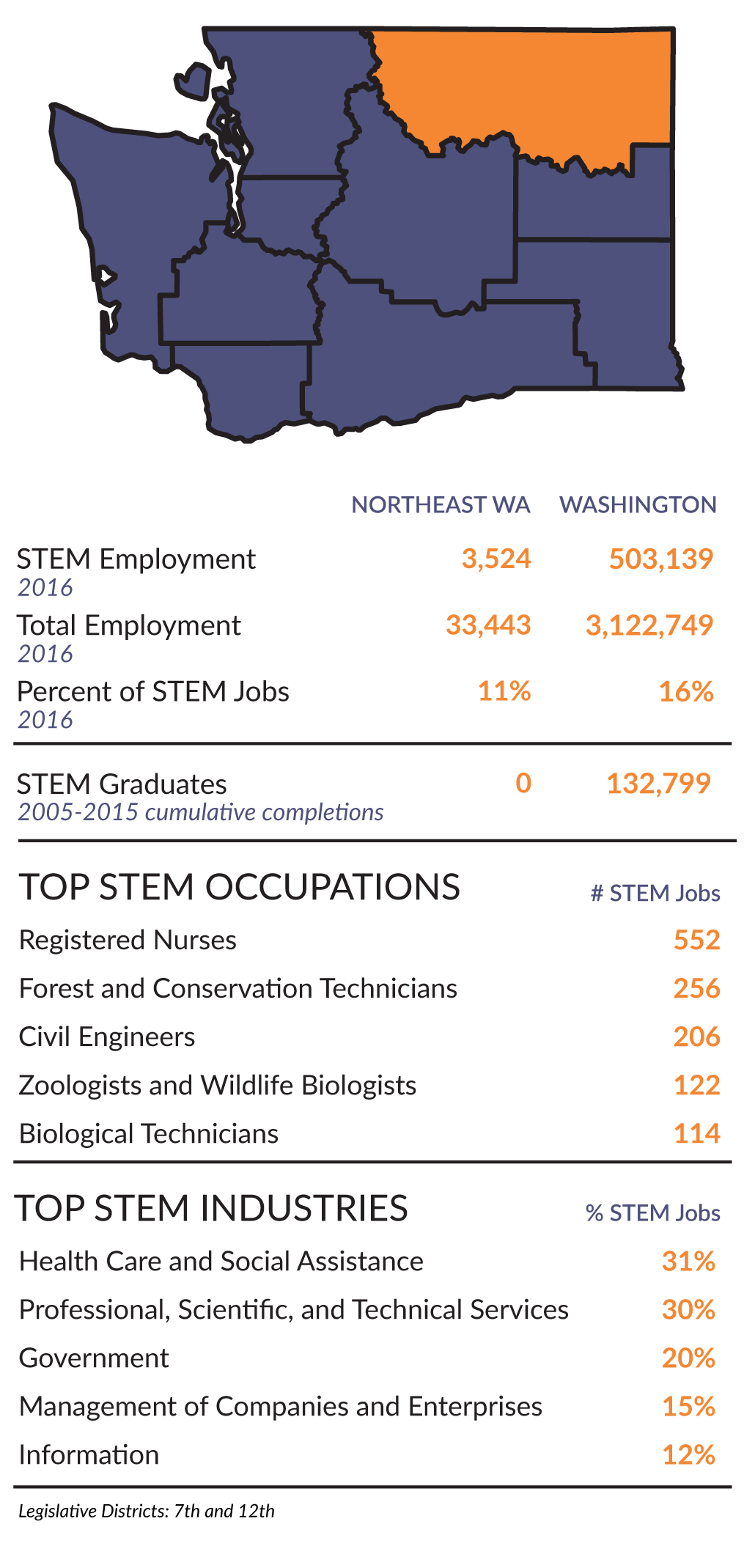

power energy
Pend Oreille County PUD and Evluma
Pend Oreille County
When you think of power maintenance, you probably don’t think of bees as a cause for light outages. For the Pend Oreille County PUD linemen, though, beehives can be a real problem, as they are often tasked with fixing streetlights with beehives inside. In June 2017, the PUD completed its conversion of the county’s legacy street and area lighting to AreaMax LED, which has a sealed light fixture preventing bees from getting inside. This helped the PUD’s linemen be more efficient in their jobs, which heightened overall productivity for the PUD. Beyond the bees, the new lights allow for digital tracking (via the ConnectLED app) and control, further improving response rates, productivity and cost savings. The PUD uses Washington-based Evluma for the conversion to its LED products, and has already noticed energy and cost savings since the change.
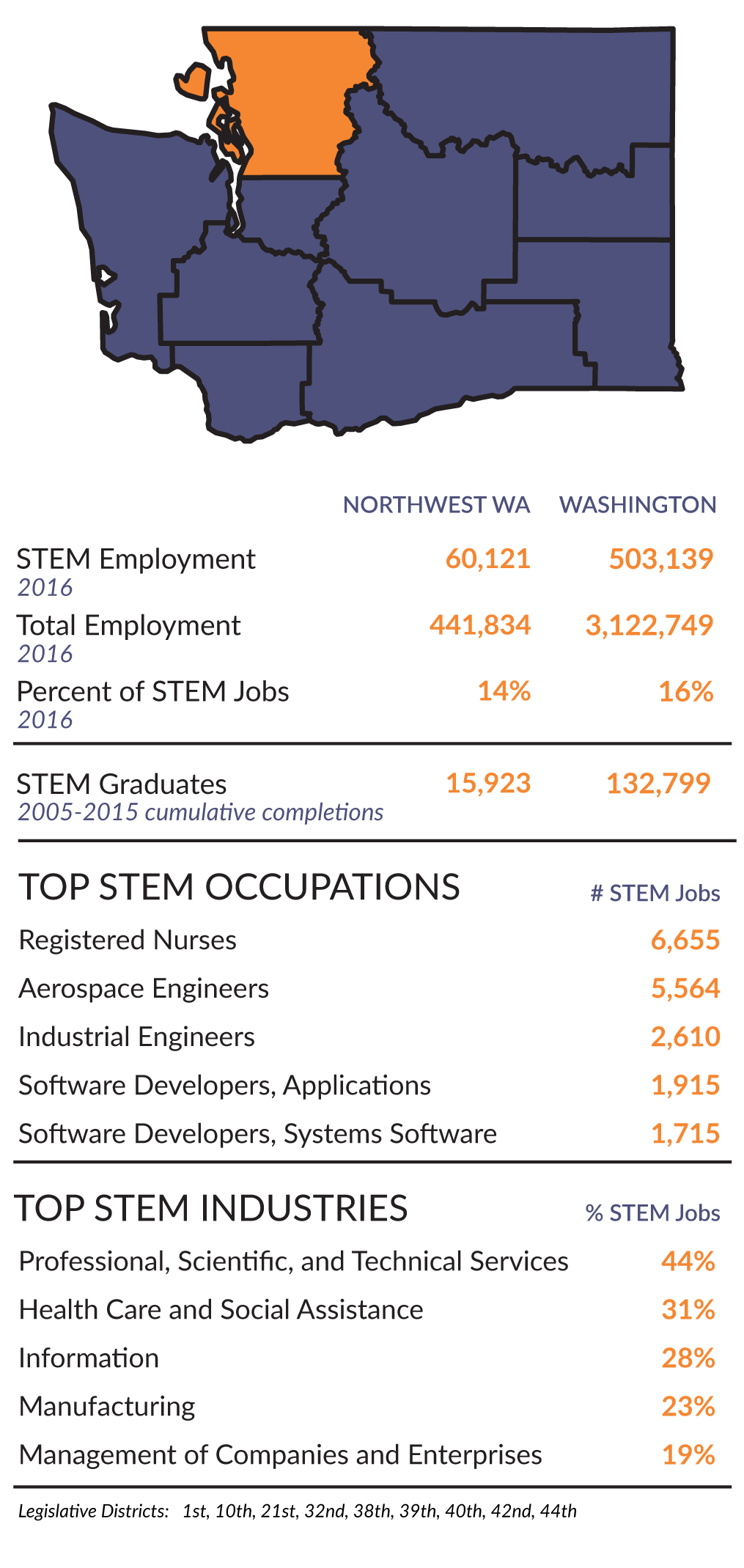

health healthcare
Cascade Prosthetics & Orthotics
Mt. Vernon, Skagit County
Cascade Prosthetics & Orthotics in Mt Vernon has provided prosthetic devices to Washington state companies since 1982. One device, the Rheo Knee, is a smart knee that uses artificial intelligence and automatically adapts to an individual’s walking style and environment, learning continuously and optimizing control over time.
Source: Cascade Prosthetics & Orthotics
health healthcare
GenCare Lifestyle at Scriber Gardens
Lynnwood, Snohomish County
Lynnwood-based GenCare Lifestyle at Scriber Gardens uses computer programs created by Pop Cap Games and Big Fish Games to help its residents improve brain function and cognitive abilities. The facility employs different technologies to keep its residents healthy physically, mentally, emotionally and socially. GenCare Lifestyle monitors residents’ fitness through computerized fitness equipment offered by Technogym. Computers in the facility’s Stay Sharp Centers feature programs created by Pop Cap Games and Big Fish Games that help residents improve brain function and cognitive abilities. By collaborating with MindRAMP Consulting, GenCare Lifestyle has deployed some of the latest technology to promote brain health and wellness.
Source: Gencare Lifestyle

power energy
University of Washington and Western Washington University
Whatcom County AND King County
School rivalry is alive and well - but in the case with Western Washington University (WWU) and the University of Washington (UW), competition is set aside and solar innovation is created. In summer 2017, New Mexico-based UbiQD reached an agreement with WWU and UW to exclusively license luminescent solar concentrator (LSC) technology that was developed at WWU’s Advanced Materials Science and Engineering Center with UW’s CoMotion via funding from the National Science Foundation. While the technology was created by these two Washington universities, UbiQD will be commercializing the technology. While this particular technology is now licensed, the universities are still researching new approaches for converting sunlight into hydrocarbon fuels. This homegrown tech is just one product of collaboration and partnership between Washington’s universities.
Learn more: Western Washington University
power energy
UniEnergy Technologies, Snohomish PUD and PNNL
Mukilteo, Snohomish County
Storage. Storage of dishes, clothes, seasonal items like golf clubs, skis, holiday decorations. But immaterial matter can also be stored such as energy. In the beginning of 2017, the Snohomish PUD in Everett, Washington installed an advanced vanadium flow battery called the 2 megawatt/8 megawatt-hour megawatt-hour battery, which was made by UniEnergy Technologies (UET) out of Mukilteo, Wash. The battery is the world’s largest containerized vanadium flow battery storage systems by capacity, and uses electrolyte chemistry that was developed and patented by Washington’s own Department of Energy’s Pacific Northwest National Laboratory (PNNL) then licensed to UET for commercialization. These batteries are fully containerized, nonflammable, reusable batteries that use 100% of the energy stored in them, and last over 20 years. The batteries are safer, more scalable, longer-lasting, and cheaper, as they reduce the cost of storage by about $.05/kWh. To support the installation, PNNL provided analytical and technical support for UET’s testing and pilot projects. Currently, UET employs 50-60, and with additional customers Spokane utility Avista and California avocado company Mission Produce, and will be increasing that number as the company grows.
Learn more: Energy Response Solutions, Pacific Northwest National Laboratory, Forbes, Seattle Times

AEROSPACE More
Boeing
Aerospace, Snohomish County
Try reaching overhead, leaning slightly to the right. And keep doing this throughout the work day. Physical labor in all of its forms is hard work and can lead to injuries - yet Boeing is now utilizing robots to make workplace improvements. In preparation for its 777x, Boeing is focused on increasing efficiency while also improving safety and reducing injuries and ergonomic stress across at its main Everett factory. “Providing a safe working environment is the right thing to do for our employees and our business,” said Perry Moore, 777X Wings leader. “People perform better and managers can better manage their workload. Everyone wins.” Examples of safety improvements are varied. One station has devices in place to support power hand tools so employees no longer have to use their own power to hoist and hold the tools. In the wing build-up area, transitioning to a horizontal build line will put more work in employees’ “strike zone” and make obsolete the upright build tools used to work on steeply slanted surfaces. Jordan Northrup, a 777x mid-bodies structures mechanic lead, feels the difference in his shoulder. He now operates and maintains robots that do much of the repetitive drilling and driving work he used to do manually. “It’s 100 percent different,” Northrup said. “I’m still worn out at the end of my shift, but I don’t wake up in pain in the morning after countersinking 300 holes.” While employees have had to learn how to perform their work differently, it’s a welcome transition that ultimately improves productivity: more efficiency AND greater safety.
Learn more : Geekwire
Advanced Manufacturing / Technology
Boeing, Western Washington University & Whatcom Community College
Cybersecurity / Education, Whatcom County
Do you receive a lot of SPAM emails? And how about those virus emails that actually make it to your inbox? Cybercrime is not going away anytime soon.. Washington stands out in Cybersecurity innovation with investment firing on all cylinders – Washington-based investing (such as Boeing’s HorizonX Ventures and Microsoft Ventures), Washington-based cybersecurity start-ups (like Polyverse Corporation), and higher education cybersecurity programs.In fact, the state has five federally recognized centers for cyberdefense education. In Pasco, a three-year-old cybersecurity program at Columbia Basin College has seen a 60% increase in enrollment in the past three years, with about 100 students currently enrolled. And, Whatcom Community College’s CIS program enrollment has increased an average of 18% over the past four years, with 218 students enrolled in CIS program courses in 2016. Further, with Boeing’s support, Western Washington University has new computers for its CyberRange at Olympic College Poulsbo, a virtual environment where students in Western’s Computer Information System Security (CISS) program practice cyberwarfare training and cyber technology development.
Source: Cybersecurity Ventures, KHQ, Western Washington University, Seattle Times, Bellingham Herald
Advanced Manufacturing / Technology
Microsoft’s HoloLens and PACCAR
Advanced Manufacturing / Technology, Snohomish County
Virtual Reality (VR), Augmented Reality (AR), Mixed Reality (MR). All versions of tech-driven altered reality. What is the difference between them? VR displays objects that are not there, while AR is the ability to see real world objects (digitally enhanced) in your physical environment, yet it is a digitally enhanced version of that reality. MR (mixed reality) is essentially a combination of both. You can see and remain in the “real world,” yet you are also seeing virtual objects. Microsoft’s HoloLens allows its users to do just that. Imagine you and your colleagues can collaborate together in a shared physical space, while also viewing the same VR hologram. That is precisely what PACCAR’s engineering and sales teams are doing. By using HoloLens’ MR technology during the design process for new engines, engineers save time and resources – allowing for faster, real-time collaboration and innovation. At the same time, PACCAR’s sales teams are using the technology to elevate the sales experience for their customers - making the process both more fun and interactive. To ensure seamless integration of HoloLens into PACCAR’s workflow, Microsoft has a PACCAR-dedicated HoloLens team supporting the implementation and operation of this new, homegrown technology.
Watch and Learn: Youtube Video
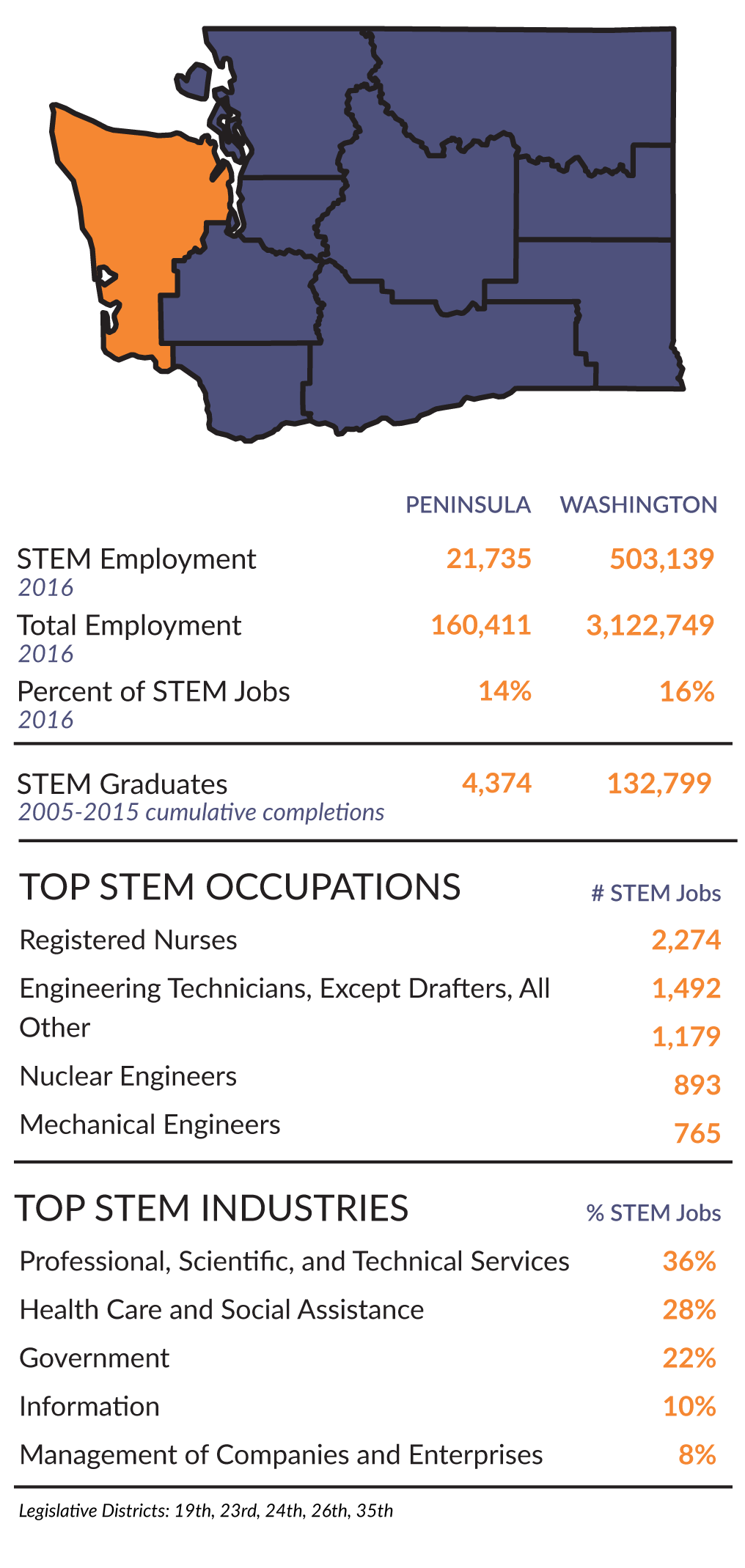

Advanced Manufacturing / Technology
Olympic College Poulsbo
Cybersecurity / Education, Kitsap County
Do you receive a lot of SPAM emails? And how about those virus emails that actually make it to your inbox? Cybercrime is not going away anytime soon.. Washington stands out in Cybersecurity innovation with investment firing on all cylinders – Washington-based investing (such as Boeing’s HorizonX Ventures and Microsoft Ventures), Washington-based cybersecurity start-ups (like Polyverse Corporation), and higher education cybersecurity programs.In fact, the state has five federally recognized centers for cyberdefense education. In Pasco, a three-year-old cybersecurity program at Columbia Basin College has seen a 60% increase in enrollment in the past three years, with about 100 students currently enrolled. And, Whatcom Community College’s CIS program enrollment has increased an average of 18% over the past four years, with 218 students enrolled in CIS program courses in 2016. Further, with Boeing’s support, Western Washington University has new computers for its CyberRange at Olympic College Poulsbo, a virtual environment where students in Western’s Computer Information System Security (CISS) program practice cyberwarfare training and cyber technology development.
Source: Cybersecurity Ventures, KHQ, Western Washington University, Seattle Times, Bellingham Herald
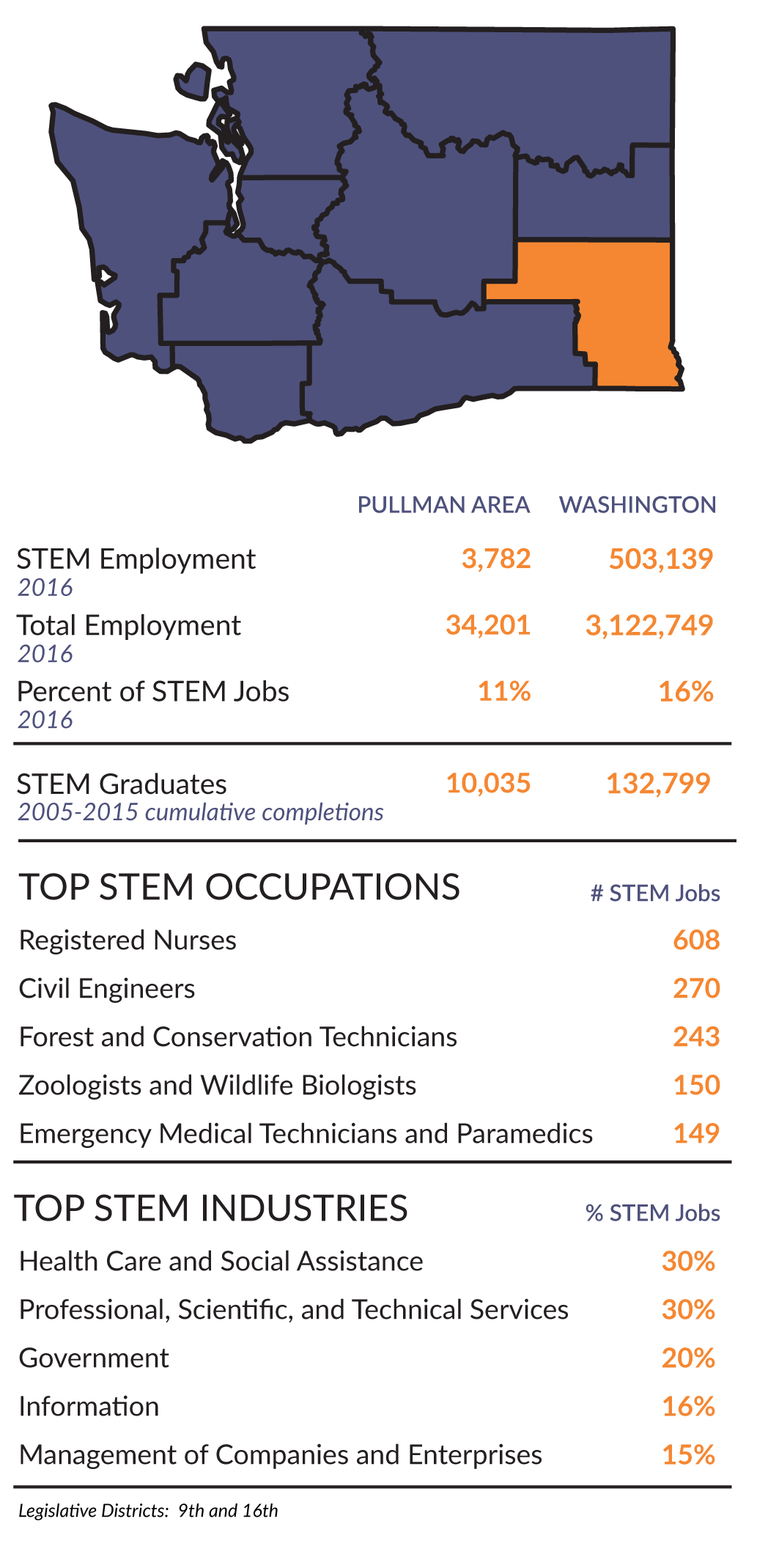

apple
Phytelligence
Burien, King County
Trees grow in soil...right? Washington State University start-up Phytelligence has figured out a way to grow trees - most commonly fruit trees - in a nutrient rich gel. This process was first created by Washington State University’s Professor Amit Dhingra in 2012 out of his Horticulture Genomics and Biotechnology Research laboratory, and now has 70 employees. The company has offices in Burien, Pullman and Portland, and grows up to 29 million plants each year. Primarily used during a tree’s early stages of growth, Phytelligence’s gel creates a controlled environment that helps cut down the number of viruses that might attack the young tree roots, and also helps maintain uniformity of the trees. Not only does this gel help create a more pest-free growing environment for trees, it helps farmers grow more plants more quickly. This sustainable technology supports the expedited growth of crops - from apples and cherries to almonds and hops, while decreasing water, pesticide, and fungicide use.
Learn more: Seattle Times Article , Phytelligence

power energy
Schweitzer Engineering Laboratories
Pullman, Whitman County
Schweitzer Engineering Laboratories in Pullman invented the first all-digital relay, which revolutionized the power industry by reducing costs and complexity of power protection. Today, these computer-based systems that detect electrical faults are used throughout the US. The Schweitzer digital relays are used in utility and industrial electrical power transmission and distribution systems.
Learn more: Schweitzer Engineering Laboratories
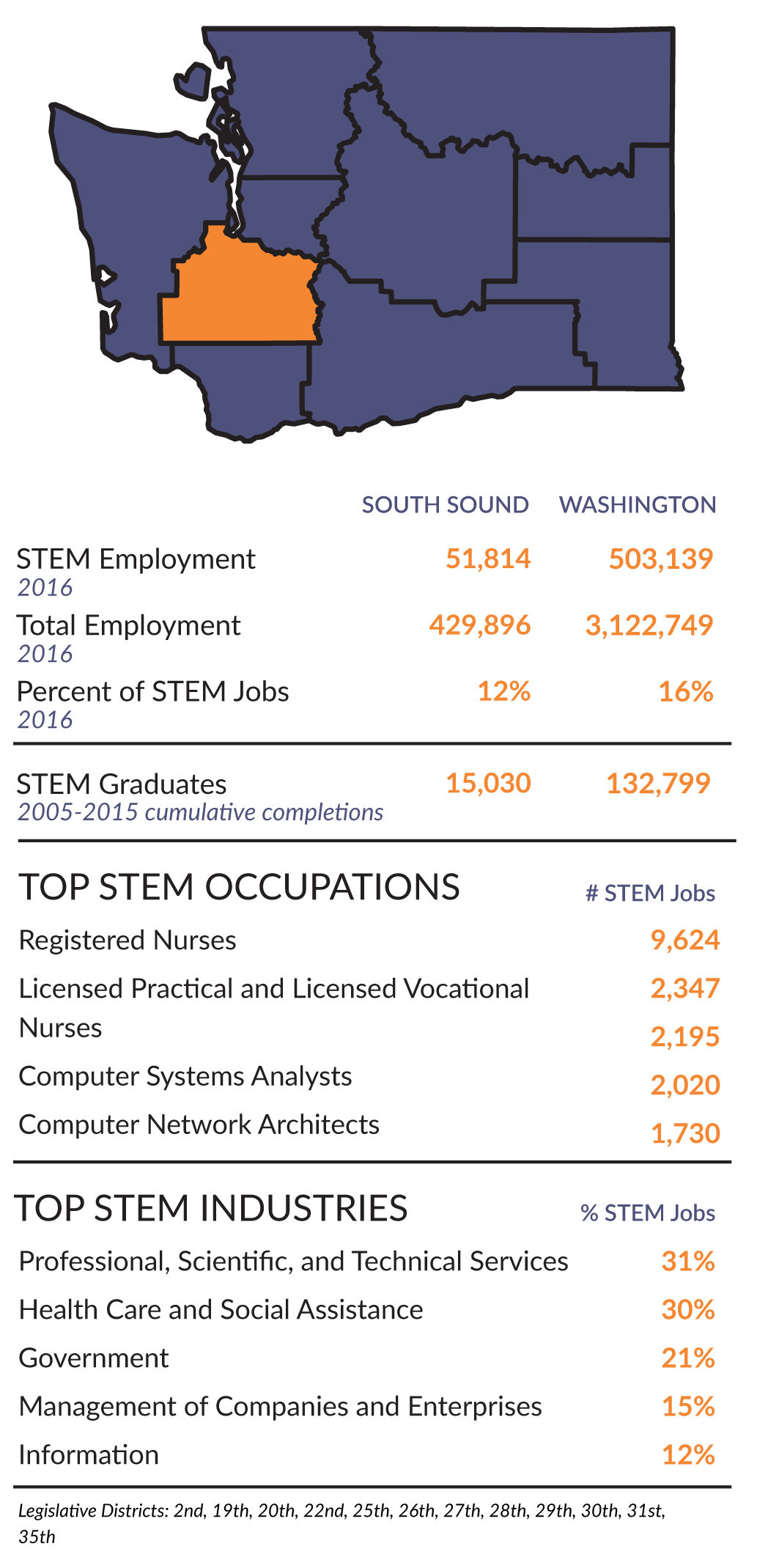

health healthcare
CHI Franciscan Health
Tacoma, Pierce County
CHI Franciscan Health, headquartered in Tacoma, has helped pioneer telemedicine in Washington state, offering virtual healthcare since October 2013. The results have been promising—the number of times patients page Franciscan Health’s on-call providers has decreased dramatically and there has been a 50 percent reduction in the number of times Franciscan doctors are awakened by calls in the middle of the night. Based on the positive results achieved so far, Franciscan aims to expand its program by looking at ways to integrate virtual urgent care into longer-term chronic care.
Source: CHI Franciscan Health
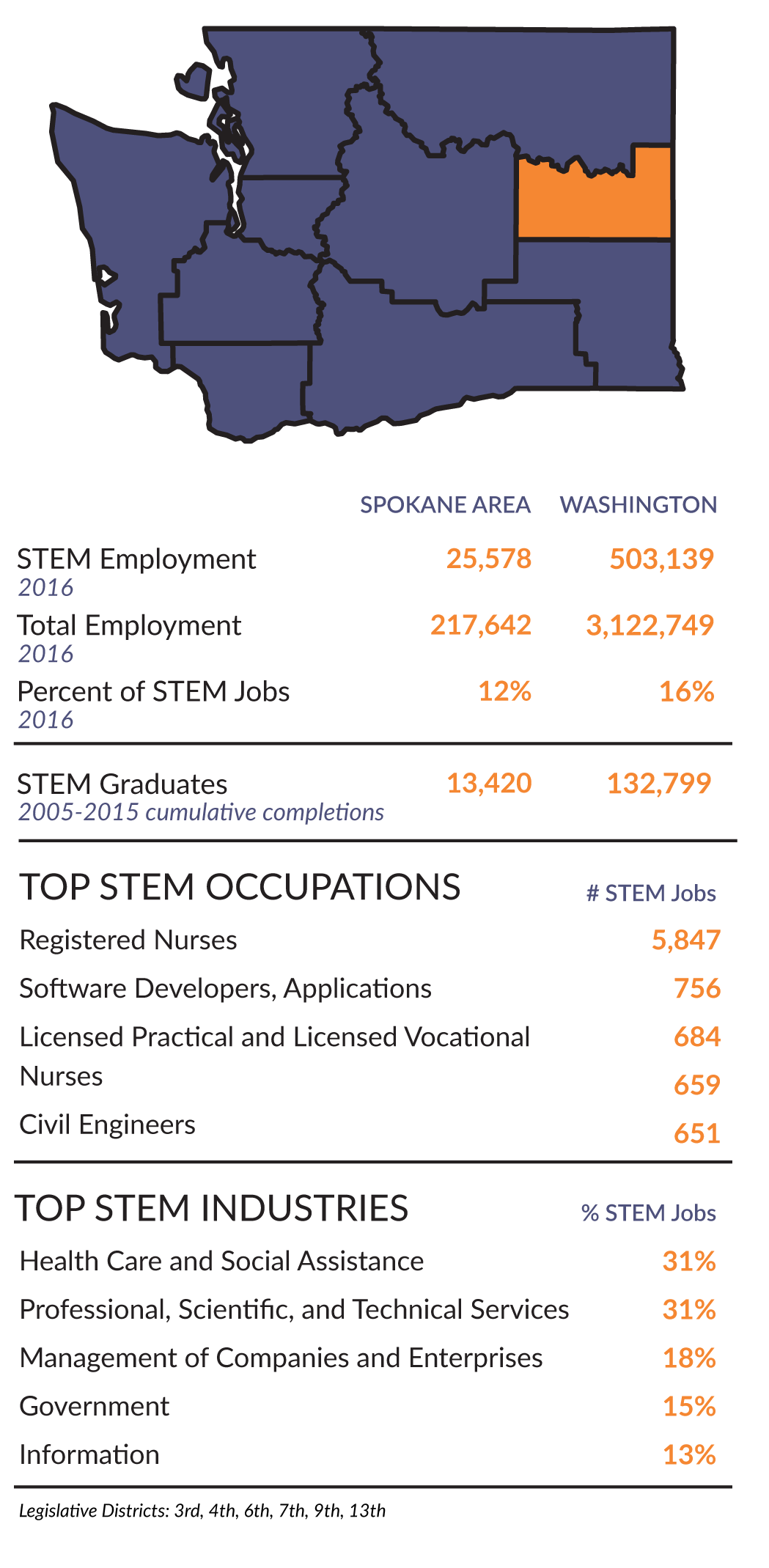

power energy University District
Washington State Department of Commerce, Avista and Snohomish PUD
Spokane
In an economy that is driven by technology, one challenge all industries face is how to stay ahead of consumer and market trends. In power, this is no different. There are two efforts underway focused on modernizing Washington’s electric system to ensure our power supply is reliable, flexible, and resilient against shifting and evolving conditions. Two utilities -Spokane’s Avista and the Snohomish PUD have each received $3.5 million from the Washington State Department of Commerce’s Clean Energy Fund. Avista is innovating a ‘Shared Energy Economy Model’, which shares its energy assets between the utility and the consumer to maximize the resource in the community. SnoPUD is designing a Microgrid and Clean Energy Technology Center in Arlington, which will both be used for conducting R&D on various clean and sustainable energy solutions, bringing new types of jobs to the region. Washington’s Clean Energy Fund supports the state’s initiative to innovate the power sector for low-carbon solutions.
power energy
Ecova
Spokane, Spokane County
Energy management information systems combine software, hardware, and data to help commercial building owners uncover energy-saving opportunities and operate their buildings more efficiently. Spokane’s Ecova, in partnership with Verisae Inc has developed a technology and service based solution that allows business owners to continuously monitor facility operations. Their Continuous Monitoring System proactively analyzes data in real-time, even for multisite companies, to detect issues and anomalies to predict equipment failure before an issue can arise.
Source: Ecova
power energy & ADVANCED MANUFACTURING
Safeguard Equipment and Avista
Advanced Manufacturing / Power, Spokane
Utility linemen, construction workers, firefighters, disaster relief teams, first responders -- all individuals who brave unpredictable circumstances every day. One of those is the risk of electrocution. Safeguard Equipment, a startup located in Spokane, Washington, is developing a wearable that can detect the proximity and direction of potentially harmful electricity. When founders Tim Ledford, Brandon Bledsoe, and John Thompson learned that linemen have a 1 in 50 chance of dying on the job, the team became passionate about developing a product that could not only make these jobs less stressful, it could save their lives. The company’s patent-pending innovation ‘Compass’ is a device that learns and adapts to its environment to ensure safety as work environments change. It comes in the form of a clip that attaches to the brim of a hard helmet. Given the technology and manufacturing required, the team opted to start their business in Spokane because of its broad manufacturing presence and close proximity to computer science programs. Spokane utility Avista is one of Safeguard’s partners, and has committed time and resources into Safeguard because the utility believes in the start-up’s cause to help reform safety standards in the power industry.
power energy & ADVANCED MANUFACTURING
Urbanova
Technology / Power, Spokane
Did you know that Spokane’s Urbanova has been recognized as an an innovator in the “smart cities” movement? Since 2014 Urbanova has been bringing together leaders in utility infrastructure, smart metering and communications, higher education, energy efficiency, population health, and urban planning to create a smart city proving ground in the heart of Spokane. Urbanova is focused on citizen-driven applications that strive for social, environmental and economic resiliency and equity. Founding partners Avista, the City of Spokane, Itron, McKinstry, the University District Development Association, and Washington State University are committed to establishing an open architecture, open data and open analytics platform to develop scalable and replicable solutions for cities everywhere.
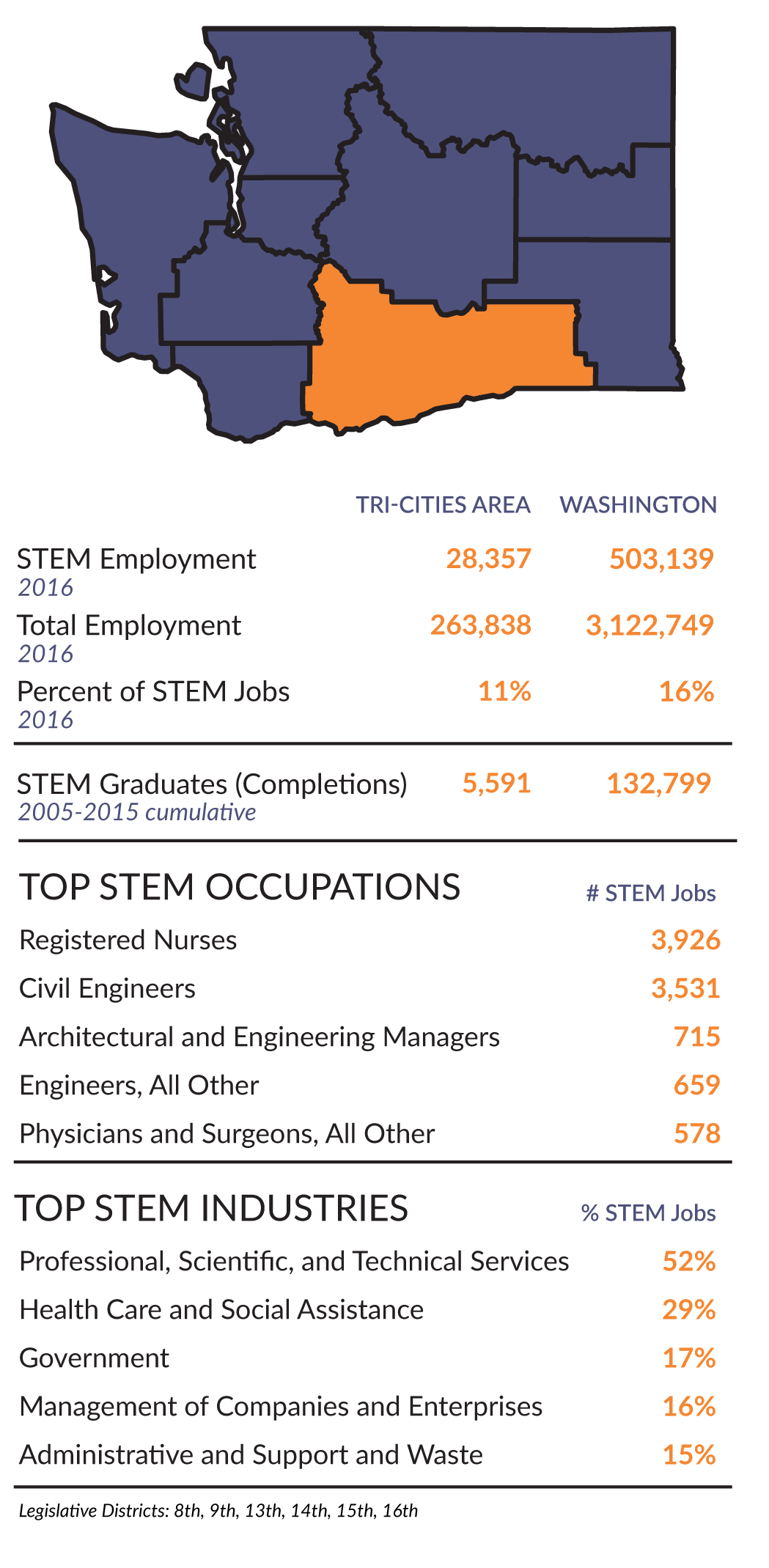

apple
Matson Fruit
Selah, Yakima County
Often, large orchards have their own cold storage facilities. Selah-based Matson Fruit installed an automated storage retrieval system in its warehouse. This robotic system automatically places and retrieves loads based on user input and a database of information gathered about customer preferences and needs. With this information programmed into the system, employees don't need to remember customer pallet type or fruit size preferences.
Learn more: Matson Fruit
apple
Nelson Irrigation
Walla Walla, Walla Walla County
Equipment manufacturers increasingly incorporate technologies into their products to increase efficiency and cost savings for orchards and other agriculture producers. Nelson Irrigation in Walla Walla has developed a wireless irrigation control system for use in agriculture. The system gives users more precise control over irrigation cycle times compared to traditional hardwired systems, enabling farm operations to save water, energy, and chemical inputs while collecting detailed data on irrigation and water meter readings.
Learn more: Nelson Irrigation
apple
Washington Fruit & Produce
Yakima, Yakima County
Technologies are revolutionizing the packing and sorting process for Washington companies. Washington Fruit & Produce, a 100-year-old apple, pear, and cherry grower based in Yakima, completed new packing plants in Yakima in 2015. The new plants use optical sorters that assess apples for external defects and internal bruising. While the company still employs the same number of workers, fewer workers are involved in manual defect sorting, increasing the operation's efficiency. The company also uses a new supply chain system that allows it to trace fruit down to the box level, ensuring that the correct product is shipped to each customer. Advanced traceability programs also help public health officials trace and prevent potential safety concerns.
Learn more: Washington Fruit & Produce

power energy
Pacific Northwest National Laboratory
Richland, Benton County
Development of better technologies for capturing carbon emissions from coal is addressing the problem of increasing emissions from power generation. However, much of the challenge is in reducing the costs and time it takes to develop these technologies. Scientists at the Pacific Northwest National Laboratory have found a way to shorten the process of testing the properties of different carbon-capture solvents to a few hours or days through the use of a computational model. The model predicts how easily a solvent will flow and how much carbon it will capture, allowing chemists to focus on the best candidates.
Learn more: Pacific Northwest National Laboratory
power energy
UniEnergy Technologies, Snohomish PUD and PNNL
Benton County
Storage. Storage of dishes, clothes, seasonal items like golf clubs, skis, holiday decorations. But immaterial matter can also be stored such as energy. In the beginning of 2017, the Snohomish PUD in Everett, Washington installed an advanced vanadium flow battery called the 2 megawatt/8 megawatt-hour megawatt-hour battery, which was made by UniEnergy Technologies (UET) out of Mukilteo, Wash. The battery is the world's largest containerized vanadium flow battery storage systems by capacity, and uses electrolyte chemistry that was developed and patented by Washington's own Department of Energy's Pacific Northwest National Laboratory (PNNL) then licensed to UET for commercialization. These batteries are fully containerized, nonflammable, reusable batteries that use 100% of the energy stored in them, and last over 20 years. The batteries are safer, more scalable, longer-lasting, and cheaper, as they reduce the cost of storage by about $.05/kWh. To support the installation, PNNL provided analytical and technical support for UET's testing and pilot projects. Currently, UET employs 50-60, and with additional customers Spokane utility Avista and California avocado company Mission Produce, and will be increasing that number as the company grows.
Learn more: Energy Response Solutions, Pacific Northwest National Laboratory, Forbes, Seattle Times

cybersecurity education
Columbia Basin College
Cybersecurity / Education, Benton County
Do you receive a lot of SPAM emails? And how about those virus emails that actually make it to your inbox? Cybercrime is not going away anytime soon.. Washington stands out in Cybersecurity innovation with investment firing on all cylinders – Washington-based investing (such as Boeing's HorizonX Ventures and Microsoft Ventures), Washington-based cybersecurity start-ups (like Polyverse Corporation), and higher education cybersecurity programs.In fact, the state has five federally recognized centers for cyberdefense education. In Pasco, a three-year-old cybersecurity program at Columbia Basin College has seen a 60% increase in enrollment in the past three years, with about 100 students currently enrolled. And, Columbia Basin College's CIS program enrollment has increased an average of 18% over the past four years, with 218 students enrolled in CIS program courses in 2016. Further, with Boeing's support, Western Washington University has new computers for its CyberRange at Olympic College Poulsbo, a virtual environment where students in Western's Computer Information System Security (CISS) program practice cyberwarfare training and cyber technology development.
Source: Cybersecurity Ventures, KHQ, Western Washington University, Seattle Times, Bellingham Herald
wine broadband agriculture
CenturyLink
Broadband, Walla Walla County
Washington state is at 94% broadband coverage, making it the 12th most ‘connected' state. Nonetheless there are still counties without great connectivity (reach, bandwidth and cost are all barriers). Wireless providers like CenturyLink are partnering with regional municipalities to find solutions to improve coverage and speed. In Fall 2016, CenturyLink expanded its fiber-optic network in select areas in Walla Walla County to enable local businesses to process information faster, reach customers quicker, and grow their businesses and markets. There are now more than 160 wineries in Walla Walla, most all of which have international distribution and need high speed internet to facilitate their business. According to Walla Walla Community College (WWCC) Professor Nick Velluzzi, he estimated that the wine industry in Walla Walla has a $300 million annual impact on the community, which accounts for 20% of the economy. The infrastructure, along with collaborative programs like WWCC's Enology and Viticulture program, has helped to support the industry's growth and scalability.
Source: Broadband Now, Seattle Times
wine agriculture
Washington State University
Wine, Benton County
Across Washington, you can see the diverse landscape of lakes, mountains, cities, and farmland. From apples to cherries to grapes, Washington has a rich soil and climate to grow a number of crops. What many don't think about is the water it takes to grow this abundance, and the labor that goes into it. Washington State University's Department of Biological Systems Engineering is working with the Center for Precision & Automated Agricultural System to find ways to use less water when growing grapes. One study is looking at applying water to the roots of the vine versus dripping water on the ground near the trunk's base. As WSU researchers experiment with this new watering method, they need constant access to data on the vines' and grapes' growth throughout the process. Rather than, by hand and foot, measuring multiple vines and vineyards, WSU is using unmanned aerial systems (UAS) or “drones” to take the measurements. The unmanned helicopters fly over vineyards using high tech cameras to assess the status of plant health (canopy vigor) then relate that back to water use and evaporation from grapevines. While the drones eliminate a need for people do the laborious measurements by hand, they also add a need for people to learn the new set of skills required to fly, operate, and fix the drones.
Source: WSU
wine agriculture advanced manufacturing
Washington State University
Wine / Advanced Manufacturing, Walla Walla County
When wine grape clusters are picked from the vine then brought back to the winery for sorting and crush, it used to be humans that sorted these grapes by hand, picking out unwanted sticks, leaves, imperfect grapes. Now, however, this process is highly automated - and many Washington State wineries are using Walla Walla-based Key Technology's optical sorter ‘VitiSort' to remove all material from the clusters other than the grapes. In using this sorter, not only is time saved by employees who can thus be doing other tasks while the machine sorts, it actually helps winemakers create a more complex wine, given the 99.9% removal of any stems or leaves from the juice, and ensures product traceability of grapes from vineyard to bottle. When this technology first came to market for wine grapes, Walla Walla Community College received the test model so that the students in its College of Enology and Viticulture could train on the equipment, and help introduce the machine's capabilities to local wineries, which helped the industry see the benefits of using it. This education-industry collaboration has led to seven Walla Walla wineries adopting a more efficient, advanced process for crush.
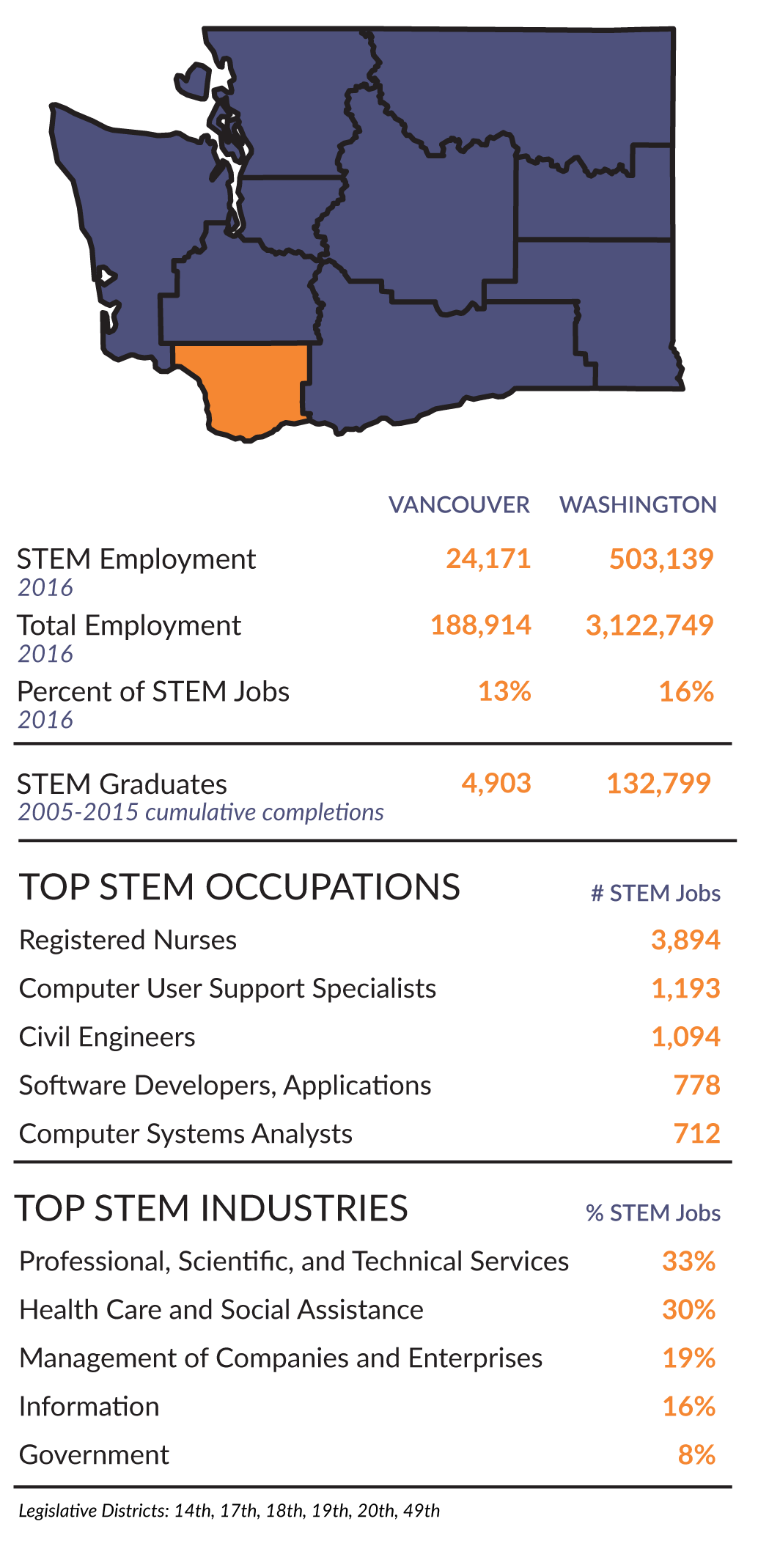

manufacturing
Washington State University Vancouver
Manufacturing, Clark County
Vancouver’s manufacturing industry is a legacy industry for the region. With companies like SCH America and Linear Technology, Clark County is home to a significant semiconductor manufacturing hub. As of May 2017, 13,400 people are employed in manufacturing. As the industry and region evolve due to technological advancements, so do skill requirements for the region’s workforce. According to the Employment Security Department, a mix of skills is needed as more and more becomes automated and mechanized in the manufacturing process. Manufacturing employers need employees who have competency with computer and electronic systems, as operating and fixing complex machinery and equipment becomes a primary responsibility, and is quite technical. To meet this demand shift in an industry driving much of Vancouver’s economy, Clark College, along with Washington State University Vancouver (WSUV), coordinate efforts and curriculum to provide students with the education required to fill these highly technical jobs. From two-year degrees to four-year degrees the colleges are supplying a growing number of CS, Mechanical Engineering, and Electrical Engineering degrees - and the pipeline between the two colleges is significant, with about75% of all Clark College graduates transferring to WSUV’s program to complete four-year programs. This is especially noticed in the technical programs.
Source: Vancouver Business Journal, The Columbian
manufacturing
Washington State Department of Commerce and Innovation Partnership Zones
Tech / Manufacturing, Clark County
As occupations, industries and communities become increasingly dependent on technology for growth, for innovation, for competitiveness, for economic vitality - so do the creative partnerships and solutions that emerge across Washington. For instance, in Vancouver, the Innovation Partnership Zone (IPZ) is an initiative designed to grow and support tech companies by cultivating partnerships between the private and public sectors, as well as education. The IPZ is a Washington State Department of Commerce designation created to stimulate the growth of industry clusters. There are 14 IPZs across the state, and Vancouver’s IPZ was awarded this designation for an applied digital technology accelerator. Recently, California-based RealWear, the maker of wearable tech, named its office at Fort Vancouver Artillery Barracks its new headquarters, where the company currently employs over 20 full time employees (70 globally). RealWear’s flagship device is its HMT-1, a helmet-mounted display and microphone that links in-the-field workers with faraway support staff. The device is used in the private sector as well as in the military.
Source: The Columbian




